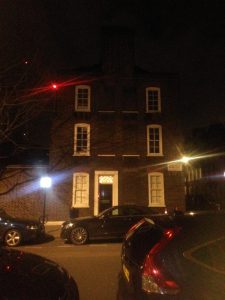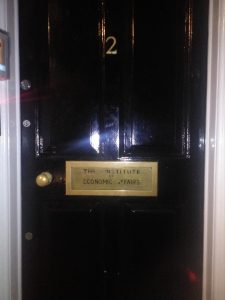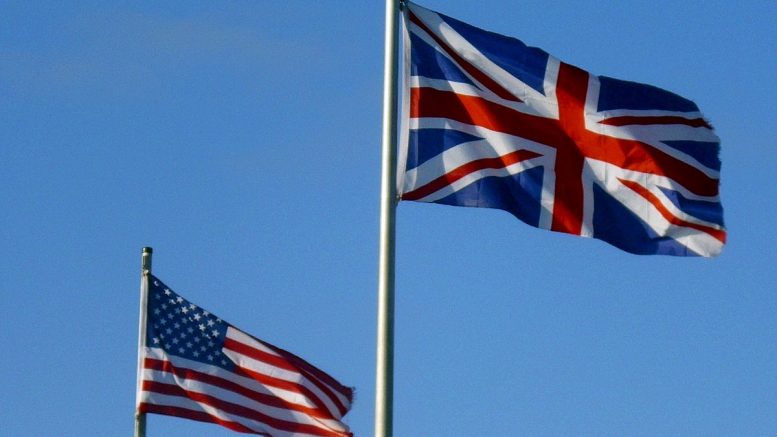Wealthy donors who head right-wing groups in the US have financed “ultra free-market” UK think-tanks according to The Guardian – bringing into question the ethics around funding these organisations
The accusations made by the British centre-left newspaper are only the latest in a whole series of claims of foreign involvement in the British political sphere.
Editor’s Picks:
- Ballon d’Or Awards 2019: Messi bags record 6th award, with Rapinoe, De Ligt and Alisson winning
- South Western Railway 27-day strike to disrupt Christmas travel
- Canada Goose and the war on fur
- Which sporting moment has defined the decade?
And it is not the first time that the newspaper has launched an attack on what are generally regarded to be the think-tanks of the right in this country.
The IEA's @mayerandrew on The @Guardian's "anti-Americanism":
"The IEA is a staunchly anti-racist organisation and we warmly welcome support from and dialogue with people of all nationalities (although we refuse to accept donations from state agencies)." https://t.co/dVORGEIqbf
— IEA (@iealondon) November 29, 2019
In addition, the Guardian alleges that the libertarian think-tanks – in particular the Institute of Economic Affairs (IEA) – known for its staunch advocacy of laissez-faire economics and close-ties with Margaret Thatcher in the 1970s and 80s – have had “unprecedented” access to the Cabinet of Boris Johnson.
While no claims have been made specifically stating instances where the pro-capitalist think-tank has directly influenced policy-making decisions in Cabinet, the inferences seem to be that this is a very real possibility.
If true, this means that think-tanks like the IEA have received large amounts of cash from American right-wingers.
And they could be using this money to gain access to and directly influence official UK government policy-makers.
All this comes in an era where rumours of Russian involvement in the Brexit vote and in the election of Donald Trump cause suspicion of foreign interference in a nation’s domestic politics and democratic campaigns and processes.
Not a Russian in sight
Eleven wealthy American donors gave a total of £2.86 million to UK right-wing think-tanks raising alarm about the influence of foreign funding on UK politics. They include: the Institute of Economic Affairs, Policy Exchange and the Adam Smith Institute. pic.twitter.com/pDcN65SxbE
— Grouse Beater (@Grouse_Beater) November 29, 2019
It is now against the law for any political party in the UK to accept donations from foreign organisations or individuals not residing in the country – with the Electoral Commission regulating this tightly.
And the traditionally Labour-backing paper has said that 11 wealthy donors who head American right-wing groups in the US have given the think-tanks copious amounts of cash said to be in the tens of millions.
The groups that The Guardian have said are donating funds to right-wing think-tanks in the UK are:
John Templeton Foundations
Pierre F and Enid Goodrich Foundation
Rosenkranz Foundation
Earhart Foundation
Krieble Foundation
Chase Foundation of Virginia
Center for Independent Thought
Donors Trust
TWS Foundation
George E. Coleman Foundation

Picture copyright: Scott Mathew. The Institute of Economic Affairs at 2 Lord North Street, London
Think-tanks play an important role in the political landscape of the United Kingdom.
And they exist to research and advocate social, political, economic strategies and policies.
So-called “policy institutes” and think-tanks in the UK, the US and the rest of the world, are to be found anywhere on the political spectrum.
No regulatory body – either independent or government – exists to monitor and control which individuals or organisations can financially support think-tanks in the UK.
And think-tanks have no legal requirement to declare where their money is coming from and is under no obligation by law to declare who their donors are, either.
This means that any person or company that wants to give money to a think-tank in this country is free to do so without any limits or checks on where that money has originated, what it is really intended for or, indeed, how much has been given.
Some are claimed to be lacking in transparency. Indeed, The Guardian made this accusation with regards to the IEA. It said that “unseen donors can influence political debate”.
However, the IEA is registered as a charity and it is therefore monitored by the Charities Commission.
The Commission issued a “regulatory alert” to the IEA in December 2018 – advising it, and all other think-tanks registered as non-profit organisations – on what is and is not acceptable “behaviour”.
| What is acceptable | What is not acceptable |
| The purpose is to educate the public. It is balanced and neutral and allows the individual to form their own view. | The purpose is to achieve a change in the law or policy which would not advance the charity’s educational purposes. It is not neutral and presents the individual with biased and selective information in support of a preconceived point of view. |
| The researchers are not linked to a particular view or opinion. | The researchers are linked to a particular view or opinion which suggests bias. |
| The arguments and conclusions are based on an objective analysis of evidence/data. | The arguments and conclusions are based on opinion and supposition. |
| It is balanced and presents and explores both sides and a range of options. It is clear what process and criteria were used to achieve this. | It is not balanced and only explores one side of the argument. |
| It does not promote a specific policy unless that policy furthers the education purposes of the charity. | It is designed to promote a specific policy and is really seeking to achieve a political outcome and risks being used as a political vehicle. |
| At events, several people with a range of views on a topic each address the audience. | At events, the audience is only addressed by people with the same views on a topic. |
Source: Gov.uk and the Charities Commission
In the past, calls have been made to designate think-tanks registered as charities – specifically the IEA – as lobbyists groups as opposed to charities.
And the neo-liberal IEA has no official affiliation to any political party.
But its current director-general Mark Littlewood was a one-time member of the Liberal Democrats and one of its founders Ralph Harris was a one-time Conservative party member. There is no suggestion of wrong-doing by either of them.
The Institute of Economic Affairs was set-up in 1955 by the aforementioned economist Ralph Harris (who later sat in the House of Lords) and wealthy entrepreneur Anthony Fisher.
https://www.youtube.com/watch?v=8LZniHvtBvM
During its early years, the ideas it espoused were considered to be on the fringe and no mainstream politician from either of the two main parties in the UK – Labour and the Conservatives – dared to take on board and advocate the implementation of the Institute’s ideas as official policies.
It seldom makes its donors known to the public – only very rarely in individual reports.
But Voice of London can confirm that this information is not contained on the think-tank’s website or in its annual accounts.
The free-market, low-tax, small state-backing institute declared an annual income of £2,521,000 at the end of the previous financial year and does not disclose any information with regards to funding on its website.
It does not declare amounts paid by funders and the website WhoFundsYou? states that there is: “No indication of the proportion of funders acknowledged.”
WhoFundsYou? gives the Institute of Economic Affairs an “E” rating. It also gives the think-tank a “Transparify” rating of “0”.

Picture copyright: Scott Mathew. The entrance to the Institute of Economic Affairs at 2 Lord North Street, London
The libertarian IEA calls for the abolition of the NHS, the legalisation of cannabis, wholesale reform of the comprehensive education system, calls climate-change an “exaggeration” and has lobbied for a so-called “hard Brexit” – for the UK to leave the single market and customs union.
It has also protested against the recent ban against Uber operating in London.
Transport for London’s ban on Uber is “an act of pure cowardice”, argues Associate Director @KateAndrs in the @Spectator https://t.co/MdZW9TfR3G
— IEA (@iealondon) December 1, 2019
The most prominent left-wing think-tank in the UK is perhaps the Fabian Society.
It was formed in the late 19th century by a small group of affluent socialist individuals, including leading journalists and writers of the day.
They were: Edward R. Pease, Edith Nesbit, Hubert Bland (Nesbit’s husband) and Frank Podmore.
The Society was set-up as a splintering of an organisation which advocated a better and “higher” society through pure intelligence called the Fellowship of the New Life.
The centre-left think-tank is viewed by many on the opposite side of the political divide as being on the fringes advocating radical socialist doctrines.
But it describes itself as a moderate organisation which seeks to promote and advocates the implementation of socialist policies by Labour governments through democratic means and the parliamentary process.
Unlike the IEA, which has no affiliation to any political party, the Fabian Society has since its inception, been affiliated to the Labour party. But it is not a faction of the party or in any way officially linked to the party.
It is one of several so-called “socialist groups” which has an affiliation to the party – meaning it openly promotes and advocates Labour as its preferred party of government.
💡 We've been influencing ideas and policy on the left since 1884. Our members and donors are at the heart of what we do 📈
Join us today 👉 https://t.co/qbwGPrT3MO pic.twitter.com/exUklJ7it1
— The Fabian Society (@thefabians) November 20, 2019
The Labour-backing think-tank is supported by its members and “subscribers” – organisations which award the Society grants and sponsorships.
And the socialist think-tank is also funded in part by profit generated by sales of its publications and tickets sold for events.
It reported an annual income of £701,450 at the end of the last financial year.
According to WhoFundsYou? it also displays all its funding information on its own website, publicly displays the names of all of its funders and declares the exact amounts of cash donated to it.
On the WhoFundsYou? site it has been given an “A” rating and a five star “Transparify” rating.
It has been accused by opponents, even in the contemporary age, of wanting to introduce communism into the UK by taking gradual control of and influencing the institutions – including universities. It debunks this as a right-wing conspiracy.
FABIAN SOCIALISM THEY ARE USING TO BRING ABOUT THIS C0MMUNISM ALA London School of Economics
from 1895, when the School was founded by Fabian Society members Sidney and Beatrice Webb, Graham Wallas,George Bernard Shaw, with funding, including£20,000 from Henry Hunt Hutchinson— The Goodman Report (@TheaGood) November 28, 2019
In this sense, the Fabian Society and the Institute of Economic Affairs are not too dissimilar in that they can both be said to have or have had their own people at the very heart of political power, enacting policies very similar to those advocated by the respective institutes.
Senior Labour figures have, in the past, had strong links to the Fabian Society and have even been members themselves.
They include relatively recent prime ministers Tony Blair and Gordon Brown – and others from history including Harold Wilson, Clement Attlee and Labour’s first PM Ramsay MacDonald.
Bank of England independence had been a policy first proposed by the Fabian Society and later adopted by the Labour party.
Both think-tanks have, it seems clear, played a role in influencing the decisions of policy-makers in government.
Paul Pickering, a lecturer at Kingston University and recently retired parliamentary aide as well as Palace of Westminster Guide, told Voice of London:
“Think-tanks exerting influence over or having links to MPs is nothing new. While The Guardian may be right to expose anything it may perceive as unethical or ‘unprecedented’, such as issues around transparency or taking funds from foreign and often controversial sources, it has in recent years very often been the case that political parties make official policies directly off the back of ideas promoted by like-minded think-tanks on the same side of the political spectrum.”
Both the IEA and the Fabian Society were approached for comment, however, they are yet to respond.
Words: Scott Mathew | Subbing: Michelle Del Rey | Featured image credit: StockPhotos

